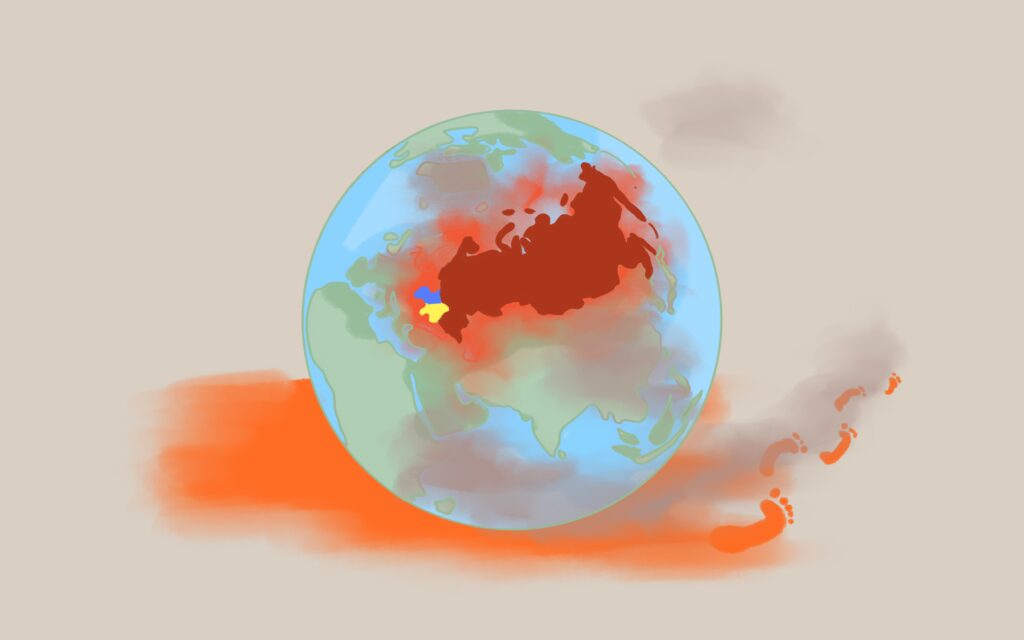
Graphic by Jewon Im ’23 /The Choate News
In today’s interconnected world, the events in one country send a ripple effect impacting the rest of the globe. The Russian invasion of Ukraine is no exception. Not only has the Ukrainian war displaced over seven million people, but it has had a drastic effect on global climate change research, policy, and innovation.
The effects of this war have demonstrated just how precarious the road toward sustainable energy usage is. In order to safeguard against the negative environmental impacts of the war, it is critical that the U.S. preserves its relationship with Russian scientists and continues to invest heavily in renewable energy.
While the Arctic Circle is not known for being the center of global politics, it has become a focal point of the climate crisis as warming temperatures rapidly thaw glaciers.
The Ukrainian War is worsening the situation in the Arctic. In early March, seven of eight Arctic Council members announced a boycott of the council meetings. The only member to remain was the Russian representative, the current chairman.
The Arctic Council was formed in 1996 to arrange “cooperation and collaboration on issues affecting the far North, including fisheries and resource management, conservation, pollution, and climate change,” according to Scientific American.
The Council’s pause on activities has created gaps in monitoring and data collection in weather, ecosystems, pollution, wildfires, and more. In the past, these studies have been critical in making recommendations for climate policy. It is especially critical that Arctic wildfires be tracked as they emit large amounts of carbon dioxide, change the landscape, and melt permafrost. About 1,500 billion metric tons of permafrost, enough to warm the Earth by 0.3 – 0.4 celsius, are stored in the Arctic Circle. Thawing permafrost could also destabilize the ground. Most of the permafrost is located in Russia, so severing ties with Russian scientists has left a hole in this area of research.
Additionally, cooperation between Russia and the international community is imperative for activities such as managing Arctic fisheries and the transportation of nuclear waste. Fish stocks in the Arctic can only be sustained through coordinated catch limits and fishing practices. Any missteps in this process need to be communicated to all the countries involved, but the doors of open communication are quickly shutting.
On March 25, U.S. President Joe Biden and European Commission President Ursula von der Leyen announced a plan to reduce Europe’s reliance on Russian fossil fuels. Prior to this announcement, 40% of natural gas and more than 25% of crude oil was imported from Russia. By turning away from Russian oil exports, these countries hope to accelerate progress towards clean energy. Instead, the U.S. announced an increase of 15 billion cubic meters (bcm) of liquefied natural gas (LNG) shipments to Europe. To contextualize these numbers, the U.S. sent 22 bcm of LNG to Europe in 2021, the largest amount that has ever been traded between the the US and Europe. The more LNG exported, the more infrastructure and LNG terminals will spring up, making it harder to decrease dependency on non-renewable energy. With that, the world is set on a concerning trajectory into full-fledged fossil fuel reliance.
Finally, sanctions on Russian metals could have implications for the development of green technology. Current plans to transition away from fossil fuels rely heavily on finding new energy sources and switching to electric vehicles, both of which require large amounts of metal. Russia is a leading copper, nickel, and platinum group metal producer. Rising metal prices and lowered supply will hinder progress towards a zero-fossil -fuel future.
Losing supplies of Russian metals, oil, and gas have exposed just how unprepared the world is for the major switch to renewable energy. Sanctions and bans on Russia should remain in place, but governments should invest equal effort into the adoption of renewable energy sources. On the research front, it is imperative that research projects and communication with Russian scientists resume. While it is important that governments around the world put economic pressure on Russia to stop the atrocities in Ukraine, doing so at the expense of climate change innovation only makes the global warming crisis more lethal. A destabilized planet will exacerbate political tensions, leading to more human conflict and suffering.
The consequences of warfare and climate change are intertwined and so are the solutions — the United States must prioritize changing the course of the climate crisis over scoring points in global politics through the war in Ukraine.




